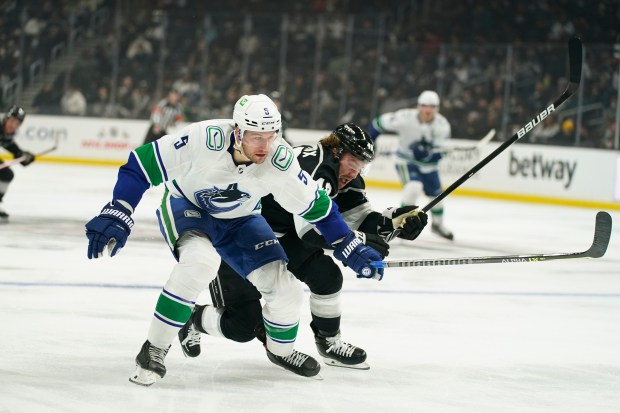In the high-stakes theatre of professional sports, time is a cruel, unyielding antagonist. For Patrik Allvin, the General Manager of the Vancouver Canucks, this ticking clock resonates with an almost palpable intensity. Following a rollercoaster couple of seasons, the pressure to sculpt a legitimate Stanley Cup contender is not merely present; it is, by his own admission, a foundational element of his daily reality.
The Echo of Expectations: A Tale of Two Seasons
The recent history of the Vancouver Canucks reads like a dramatic two-act play, with an audience left breathless and somewhat bewildered. The 2023-24 season was a symphony of success, a harmonious blend of talent and strategy culminating in an impressive 109 points. It was a season that rekindled hope, redefined expectations, and for a fleeting moment, made the pursuit of hockey`s ultimate prize seem not just plausible, but imminent. Then came the following campaign, a stark contrast where the music soured, marred by debilitating injuries, internal strife, and a precipitous drop to 90 points. The numerical difference, a mere 19 points, belies the chasm in emotional impact and fan perception. Disappointment, as they say, is often calibrated by the height of one’s expectations.
This seesaw of fortunes has created a binary atmosphere: the upcoming season is unequivocally “make-or-break.” Not just for the players, who face the immediate consequences on the ice, but for the entire management structure, with Allvin at the helm.
The GM`s Candid Acknowledgment: Pressure, Not Just Urgency
Allvin, in a recent dialogue, meticulously distinguished his sentiment from mere urgency, opting instead for the more profound term: pressure. This isn`t the frantic rush of a last-minute assignment; it’s the constant, grinding weight of responsibility that comes with managing a multi-million-dollar franchise and the hopes of an ardent fanbase. His focus, he states, is fundamentally human-centric: to empower his core players – names like Thatcher Demko, Quinn Hughes, Elias Pettersson, and Brock Boeser – with the strongest possible roster. These are not just assets; they are individuals who have invested years, sweat, and ambition into the Canucks jersey.
“I definitely believe with (Thatcher) Demko, Quinn (Hughes), Elias (Pettersson) and Brock Boeser… there’s a lot of talented players and I need to build out the roster. I wouldn’t say urgency, but as a general manager the pressure comes on you because what you realize in the NHL is the years are just flying by.”
This statement, delivered with a directness that belies its underlying complexity, encapsulates the essence of his challenge. It’s a subtle nod to the fleeting nature of prime athletic careers and the narrow window of opportunity for a team to coalesce into a championship unit. In the NHL, a five-year plan can feel like an eternity, and a two-year window can slam shut without warning.
The Architecture of Ambition: Building a Winning Roster
So, what does it mean to “build out the roster” under such immense pressure? It’s far more intricate than simply acquiring talent. It involves a delicate balance of:
- Strategic Acquisitions: Identifying and securing players who complement the existing core, not just individually talented pieces. This often means shrewd trades and judicious free-agent signings that fit within a tight salary cap.
- Player Development: Nurturing prospects from within, ensuring that the pipeline consistently produces NHL-ready talent to provide depth and future sustainability.
- Chemistry and Culture: Crafting an environment where players thrive, where “melodrama” is minimized, and where a shared vision for success binds the team together. This is perhaps the most intangible, yet critical, component.
- Mitigating Risk: Accounting for the inevitable setbacks of professional sports – injuries, slumps, and the unpredictable nature of competition.
The irony is not lost on seasoned observers: everyone knows what needs to be done. The “how” is where the true difficulty lies, where general managers earn their paychecks (or, in some cases, find themselves looking for new employment).
The Unseen Opponent: Time
Allvin`s reflection that “years are just flying by” is a poignant, almost existential, observation for anyone in sports management. It speaks to the relentless progression of time, the aging of star players, the expiry of contracts, and the constant threat of injuries that can derail even the most meticulously planned strategies. A core group of players – like those Allvin mentioned – has a finite period during which they are all simultaneously in their prime and on economically viable contracts. Maximizing this window is the ultimate test of a GM`s acumen.
The Season Ahead: A City Holds Its Breath
As the new season approaches, the spotlight on Patrik Allvin and the Vancouver Canucks will be brighter than ever. The city of Vancouver, known for its passionate yet often long-suffering hockey faithful, yearns for consistent success. Allvin`s acknowledgment of the pressure, coupled with his resolute commitment to building a winning team for both the players and the fans, sets the stage for what promises to be a defining chapter in the franchise`s history. The clock is indeed ticking, and everyone is watching to see if Allvin can conduct the orchestra to a championship crescendo before the final notes fade away.

